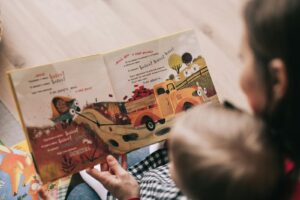Welcome to our article on developing literacy skills in young children. In today’s fast-paced world, equipping our little ones with solid literacy abilities is more important than ever. As parents, caregivers, and educators, we play a crucial role in fostering a love for reading and writing in young minds. From laying the foundation with interactive storytelling to introducing age-appropriate books, there are countless ways we can help cultivate a lifelong passion for literacy in our children. Join us as we explore the various strategies and tips for nurturing literacy skills in the youngest members of our community. Have you ever wondered how to help young children develop their literacy skills? It’s essential to their education and development, and we’re here to help! In this article, we will explore various strategies and activities to assist you in promoting literacy in young children.
Understanding Literacy Skills in Young Children
Children begin to develop literacy skills early, even before they can read or write independently. Literacy skills encompass reading, writing, speaking, and listening, all essential for communication and learning. As early childhood educators, we play a crucial role in fostering these skills in young children.
Reading Skills
Reading skills involve decoding words and understanding and interpreting written text. Children who develop strong reading skills are more likely to succeed academically and in life. Encouraging a love for reading from a young age can significantly impact a child’s literacy development.
Writing Skills
Writing skills encompass the physical act of writing and the ability to express thoughts and ideas coherently on paper. By providing opportunities for writing activities, we can help young children develop their creativity, communication skills, and fine motor coordination.
Speaking and Listening Skills
Speaking and listening skills are crucial for effective communication. Encouraging children to speak confidently, listen actively, and engage in meaningful conversations can help them become better communicators and more attentive listeners. These skills are essential for academic success and social interactions.
Strategies for Promoting Literacy in Young Children
We can implement several strategies and activities to promote literacy skills in young children. Here are some practical approaches to consider:
Storytelling
Storytelling is a powerful tool for developing literacy skills in young children. Reading aloud and telling stories can expose children to new vocabulary, sentence structures, and ideas. Encouraging children to create stories can also help them develop their imagination and writing skills.
Phonological Awareness Activities
Phonological awareness refers to hearing, identifying, and manipulating language sounds. Engaging children in phonological awareness activities, such as rhyming games, sound blending, and syllable segmentation, can help them develop crucial pre-reading skills for decoding words.
Alphabet Recognition and Letter-Sound Correspondence
Alphabet recognition and letter-sound correspondence are fundamental literacy skills that children need to learn before they can read independently. By providing children with opportunities to practice identifying letters and their corresponding sounds, we can help them build a strong foundation for reading and writing.
Vocabulary Building Activities
Vocabulary plays a crucial role in reading comprehension and writing proficiency. Introducing children to new words through reading, conversation, and hands-on activities can help expand their vocabulary and improve their language skills. Encouraging children to use context clues and word relationships can also enhance their understanding of words.
Interactive Reading
Interactive reading involves engaging children in discussions, questions, and activities while reading books. This approach can help children develop comprehension skills, critical thinking abilities, and a deeper understanding of the text. Encouraging children to make predictions, connections, and inferences can enhance their reading experience and promote active learning.
Writing Workshops
Writing workshops allow children to practice writing in a supportive and creative environment. By offering writing prompts, storytelling materials, and peer feedback, we can help children develop their writing skills and express their thoughts and ideas effectively. Writing workshops can also boost children’s confidence and motivation to write.
Technology Integration
Technology can be a valuable tool for promoting literacy skills in young children. Educational apps, online resources, and interactive games can make learning fun and engaging for children. Incorporating technology into literacy activities allows us to cater to different learning styles and reinforce critical concepts dynamically and interactively.
Developing Literacy Skills through Play
Play is a natural and effective way for young children to develop literacy skills. Incorporating literacy activities into play-based experiences can enhance children’s language development, creativity, and social skills. Here are some ideas for promoting literacy through play:
Pretend Play
Pretend play allows children to explore new roles, scenarios, and contexts through imagination and creativity. By incorporating literacy elements into pretend play, such as using props, costumes, and storytelling, we can encourage children to engage in language-rich activities and develop their communication skills.
Sensory Play
Sensory play involves engaging children’s senses through tactile materials, textures, and experiences. By incorporating literacy elements into sensory play, such as letter-shaped sand molds, textured surfaces for tracing letters, and scented playdough for spelling words, we can help children learn through hands-on exploration and discovery.
Block Play
Block play allows children to build, create, and problem-solve through construction activities. By integrating literacy elements into block play, such as labeling blocks with letters, building structures that represent words or stories, and using blocks to sequence events in a narrative, we can promote literacy skills playfully and engagingly.
Outdoor Play
Outdoor play provides children with space, freedom, and natural materials to explore and interact with their environment. By incorporating literacy elements into outdoor play, such as scavenger hunts for letters or words, nature-inspired storytelling, and outdoor reading nooks, we can foster children’s curiosity, creativity, and appreciation for the natural world.
Supporting Literacy at Home
Parents and caregivers are crucial in supporting children’s literacy development at home. Parents can help children build strong reading, writing, speaking, and listening skills by creating a literacy-rich environment and incorporating literacy activities into daily routines. Here are some tips for supporting literacy at home:
Read Aloud
Reading aloud to children is one of the most effective ways to promote literacy skills at home. Parents can help children develop vocabulary, comprehension, and a love for reading by reading books together, discussing stories, and engaging in meaningful conversations. Encouraging children to ask questions, make predictions, and retell stories can enhance their understanding of text.
Create a Reading Nook
Creating a cozy and inviting reading nook at home can encourage children to engage in independent reading and quiet play. By setting up a comfortable space with books, pillows, blankets, and soft lighting, parents can inspire children to explore new stories, characters, and ideas. Encouraging children to spend time in their reading nooks and explore different genres can foster a lifelong love for reading.
Incorporate Literacy into Daily Routines
Parents can incorporate literacy activities into daily routines, such as mealtime conversations, bedtime stories, and letter recognition games. Encouraging children to help write grocery lists, read recipes, and label household items can make literacy a natural and integrated part of their daily lives. By making literacy fun, interactive, and relevant to children’s interests, parents can support their literacy development meaningfully.
Visit the Library
Visiting the library regularly can expose children to books, storytelling events, and literacy resources. Parents can encourage children to explore different genres, authors, and topics through library visits, book borrowing, and reading programs. Participating in library activities, such as storytime sessions, book clubs, and summer reading challenges, can enrich children’s reading experiences and foster a sense of community around literacy.
Conclusion
In conclusion, developing literacy skills in young children is a rewarding and essential aspect of their education and development. By implementing effective strategies, engaging activities, and supportive environments, we can help children build strong reading, writing, speaking, and listening skills that will serve them well throughout their lives. As educators, parents, and caregivers, we play a vital role in fostering children’s literacy skills and instilling a love for learning in them. Let’s continue to support and encourage children on their literacy journey and watch them thrive as confident and competent readers, writers, and communicators.



